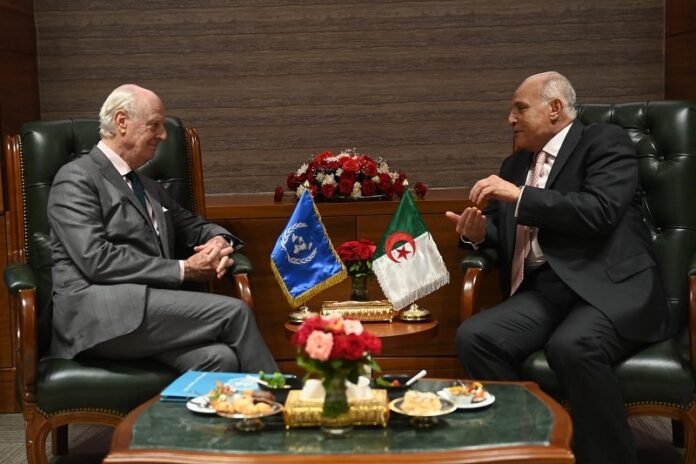Just a few weeks before the UN Secretary-General’s Personal Envoy, Staffan de Mistura, is set to present his highly anticipated report before the Security Council in October, Algiers hosted a notable visit. De Mistura was received at the presidential palace of El Mouradia, where he met with Foreign Minister Ahmed Attaf. On the surface, it appeared to be a routine stop. Yet beneath the surface, the visit carried signals of a qualitative shift in the UN’s discourse and in the international community’s approach to the Moroccan Sahara issue.
From UN “Neutrality” to Holding Algeria Accountable
What stands out is that De Mistura no longer speaks merely from the posture of a “neutral mediator.” He is becoming increasingly explicit in delivering direct political messages: Algeria is not just an “observer,” as it claims, but rather a principal party to the conflict. In a recent interview with the Italian Institute for International Political Studies (ISPI), he stressed that the issue is not simply between Morocco and the so-called “Polisario,” but between two states: Morocco and Algeria—describing the “Polisario” as nothing more than a “group” lacking sovereignty.
This marked a rare departure from the traditional UN lexicon, which has long leaned on ambiguity. For the first time, a UN envoy appeared to confront Algeria’s narrative head-on—a narrative that has portrayed it for decades as nothing more than a disinterested “neighbor.”
Washington: Autonomy Is the Only Solution
De Mistura’s tour coincided with high-level consultations, most notably with Amos Hochstein’s advisor, Masad Boulos, a senior aide to the U.S. president. Washington reiterated, through him, its unwavering support for Morocco’s autonomy initiative, deeming it the only realistic and viable solution to end the conflict.
The United States, as both a permanent member of the Security Council and “penholder” on the Sahara file, no longer views the matter as a static regional dispute. Rather, it frames it within the wider context of North African and Sahelian stability, where rising security threats and militant activity are becoming increasingly pressing.
Growing European and African Support for Morocco
This U.S. stance is echoed in key European capitals such as Madrid, Berlin, and Paris, as well as by dozens of African and Arab states that have inaugurated consulates in Laayoune and Dakhla—tangible recognition of Morocco’s sovereignty over its southern provinces. This begs the question: how long can Algeria continue to cling to its “neutrality” narrative amid such international shifts?
Algeria Between Diplomatic Isolation and Mounting Pressure
Algeria today finds itself in a precarious position. Domestically, it faces accumulating political and economic challenges; externally, its isolation deepens amid tensions with Sahelian neighbors and intensifying scrutiny at the Security Council. De Mistura’s recent statements have sharply narrowed its margin for maneuver, firmly positioning Algeria as a direct party responsible for perpetuating the dispute. October’s report may well crystallize this shift, setting the stage for a decisive moment.
The International Context Increases the Pressure
These developments cannot be divorced from broader international dynamics: the war in Ukraine, the global energy crisis, and North Africa’s rising importance as a hub for energy, security, and migration. Morocco, which has consolidated its role as a strategic Western ally, is betting that October will be the moment its autonomy plan is firmly enshrined as the sole practical pathway to resolving the conflict.
Questions for the Next Phase
-
Will De Mistura’s report, for the first time, explicitly assign responsibility to Algeria?
-
Will the upcoming Security Council session open the way for the Sahara issue to move out of the Fourth Committee and into a definitive settlement track based on the autonomy plan?
-
And how will Algeria respond to this turning point—by openly joining negotiations, or by persisting in denial and evasiveness, thereby deepening its isolation?
Toward a New Turning Point
De Mistura’s statements and his visit to Algiers are far from anecdotal; they signal a shift in the UN and international mood. With mounting U.S. and European backing, October is shaping up to be less a routine checkpoint and more a decisive inflection point—one that underscores Algeria’s clear responsibility and reaffirms Rabat’s autonomy plan as the only realistic and lasting solution to a conflict that has dragged on for decades.


